
Business
18:18, 12-Oct-2017
The Big Picture: Trump & RMB
By CGTN's John Terrett
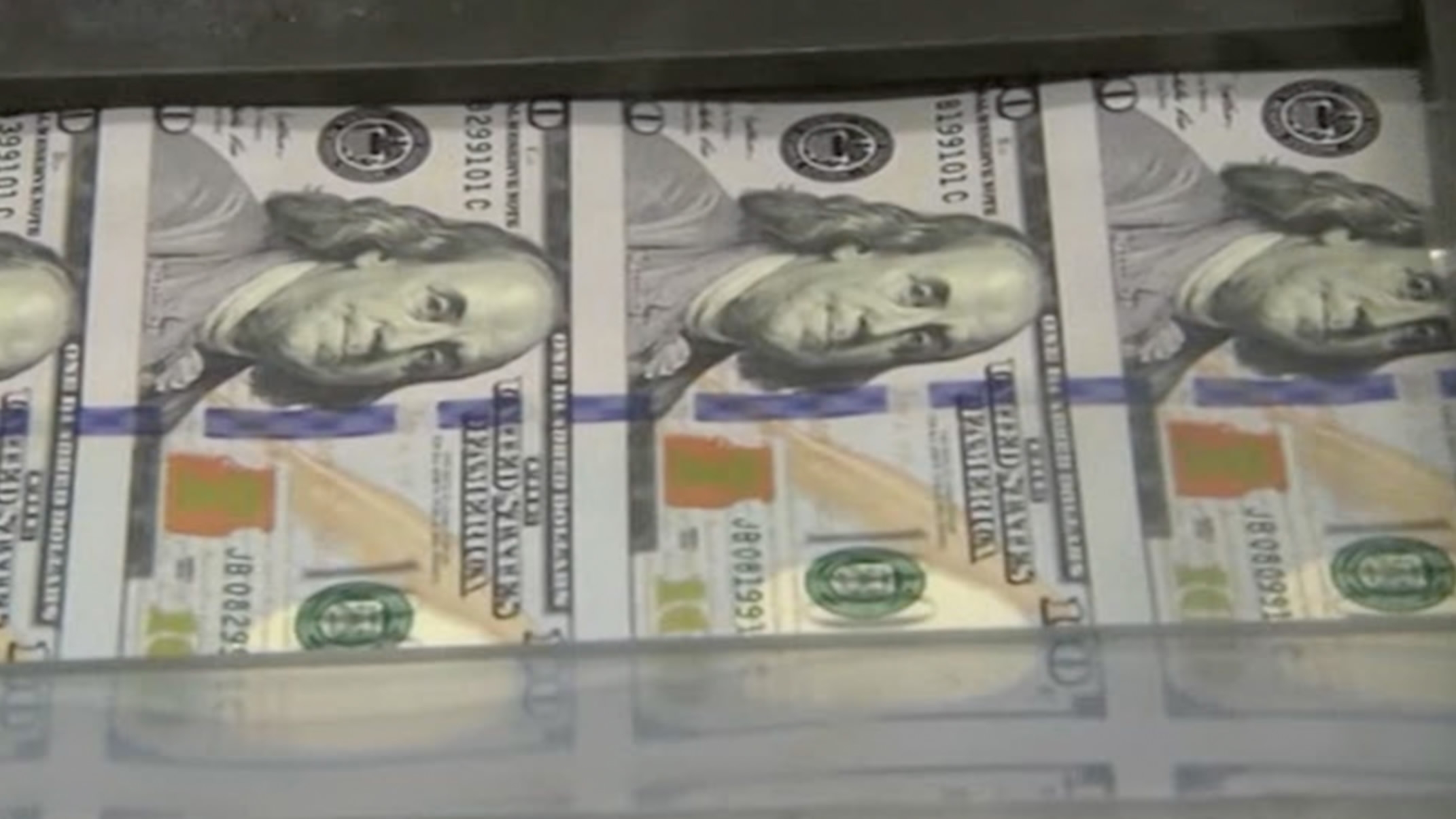
OK, so I'm a TV guy, right? I make films about people and what they're up to. Some of my reports are quite amusing — if I do say so myself — because telling a story with a little humor is a good way of making people remember your work.
So being asked by CGTN to make a film about the Chinese currency was a tough assignment. How do you make a piece of paper interesting for a global audience? Especially when it has a couple of names?
As you know there are two formal ways of referring to China's currency. Renminbi is its official name. But when Chinese people buy things they say yuan. The yuan is a unit of the Renminbi - like dimes, quarters and dollars in the United States.
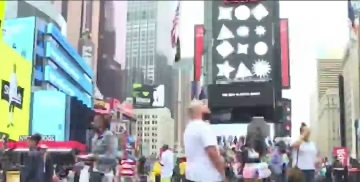
CGTN Photo
CGTN Photo
Time Square tourists
So I thought we'd start in Times Square — the so-called "Crossroads of the World" — where tourists from all over gather to see the neon signs.
Zach — my cameraman — and I descended on the Broadway theater district to see if visitors to the Big Apple could even pronounce the name “Renminbi.”
"Rem-Un-beeb" was the first attempt. "Runnyman Bee" the second. A delightful woman from New Zealand gave up, saying, "I don't know, what is this?" Finally, a handsome young man got it spot on — "Renminbi!"
"Yay! Congratulations," I said.
What a good thing it is that Chinese people have another, easier name for the yuan or Renminbi — "kwai."
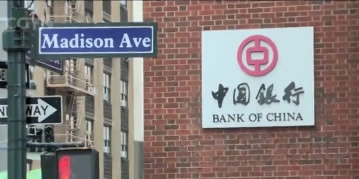
CGTN Photo
CGTN Photo
I think being English helps me understand the difference between the two names, because it's the same in the UK. We pay for things in pounds but the currency is known around the world as "Sterling."
When he was campaigning to win the White House in 2016, President Trump was very rude about China and its currency. He accused Beijing of planning to manipulate the Renminbi in the future — deliberately devaluing it — to make China's exports cheaper for overseas customers. Usually he would say something like, "China's the grand master of devaluation."
Of course, since then President Xi Jinping and Trump have met in Mar-a-Lago in Florida. They got along famously, holding frank discussions on trade and the DPRK, which continues to focus minds in Beijing and Washington DC. Indeed President Trump is slated to visit Beijing very soon.
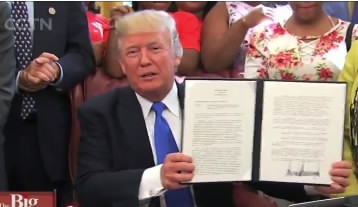
CGTN Photo
CGTN Photo
Is there a Trump effect on the RMB?
So now that he's moved out of Trump Tower and has settled in the White House - what effect, if any, has Trump had on the Renminbi?
I turned to a man whose advice I often seek when it comes to explaining China from an American perspective.
Dan Alpert is managing partner at Westwood Capital in Manhattan. He knows a thing or two about doing business with China.
"Yea, it's highly indirect," Dan told me.
He says the Renminbi tracks a basket of currencies these days — the US dollar's a major component of that basket. While for most of this year the Renminbi has spiked against the dollar, in the same time frame it's declined quite sharply against the euro.
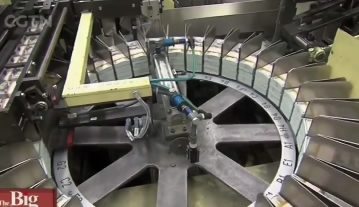
CGTN Photo
CGTN Photo
He said: "They have the best of both worlds. They have the advantageous trading position with currencies that have risen against the dollar - which has weakened considerably since the Trump administration began. On the other hand they're pretty much in the same boat as they always were with the dollar."
The US dollar initially soared after Trump's 2016 election, but his failure to get legislation through Congress, the Russia investigation, together with an economic rebound in Europe, have hit the once mighty greenback hard — sending it tumbling.
Dan told me: "At the end of the day, China cannot abandon its mercantile structure. It has to continue. It has created so much overcapacity and it doesn't really have the political environment to constrain that capacity."
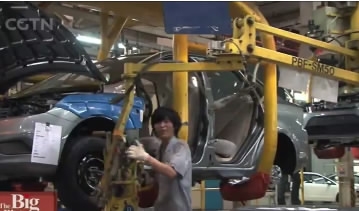
CGTN Photo
CGTN Photo
Belt and Road opportunity
The view of many in the US is that the Belt and Road Initiative is partly an attempt to find additional markets outside the developed world, even though those same folks say Beijing still needs demand from developed countries to help it employ more and more people and reduce overcapacity.
In other words, what China needs more than anything is consumerism wherever it can be found. With the Renminbi rising a little against the dollar, that helps with imports. But it's not really enough to stop Americans buying Chinese goods. And while the Renminbi's been falling against the euro and other non-dollar currencies, well, that simply helps China sell its exports more.
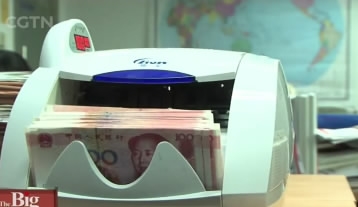
CGTN Photo
CGTN Photo
Currency of reserve
China often talks about the Renminbi having become a major global reserve currency like the dollar, the euro, and Swiss Franc — a development that would give China more clout in politics as well as trade. Some media pundits hype this, saying Beijing is on a quest to displace the dollar. A slim majority on Wall Street sees this as inevitable, given China's size and influence in the world.
Not so fast says Dan Alpert — it's most likely a long way off.
Dan said: "I don't believe the Chinese currency will become the global reserve currency. That is something I think is basically a media conceit and a conceit of a few lesser informed non-economic analysts. The number of trades in both directions that are resolved in Chinese currency is infinitesimally small in comparison to the dollar."
He says to become the world's dominant currency, China would have to be a major importer as well as an exporter over a sustained period. The Renminbi would have to be freely traded on global exchanges.
Dan continued: "I don't believe that the free exchange ability and free convertibility of the Renminbi is in the offing, at least in the next decade, and probably within our lifetimes."
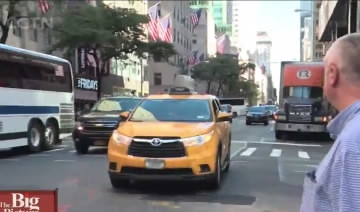
CGTN Photo
CGTN Photo
New York TAXI driver test
Now we all know you can't pay for things in New York City with a Renminbi note, just as I couldn't come to Beijing and pay a street vendor in a foreign currency. Nonetheless, I wondered how a streetwise New York taxi driver would react if he was presented with a "Redback" instead of a "Greenback" note? Would he even recognize what the currency is?
Cameraman Zach and I hailed a cab on the world famous Fifth Avenue and tried to pay with an Renminbi note when we got out at Grand Central Station.
It did not go too well.
Me: "I'd like to pay with Chinese currency?
Driver: "No, sorry we only accept dollars!"
Me: “But you can exchange it at the bank for dollars! Yes? No?”
Well, he wasn't having any of it, and I ended up paying for the fare with my credit card — including a big tip, just in case he called the cops on us!
So, maybe it is a bit too soon for the Renminbi to be on the global stage outside of Wall Street and the banks. But hey — never say never, right!
11000km

SITEMAP
Copyright © 2018 CGTN. Beijing ICP prepared NO.16065310-3
Copyright © 2018 CGTN. Beijing ICP prepared NO.16065310-3